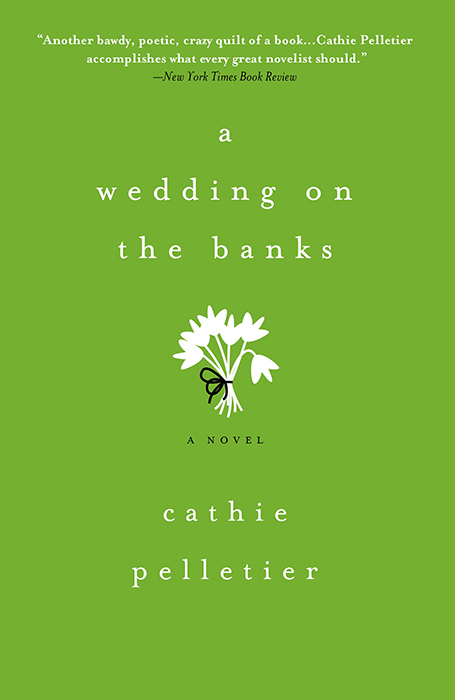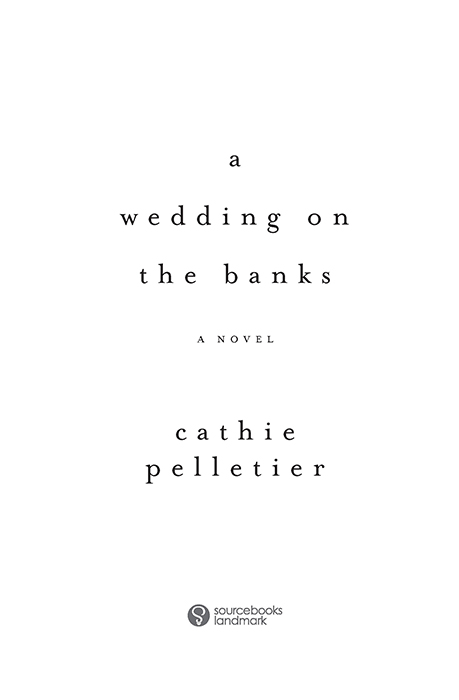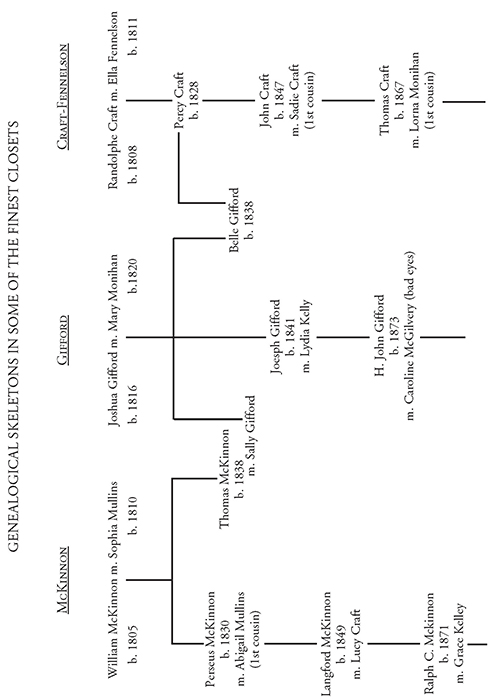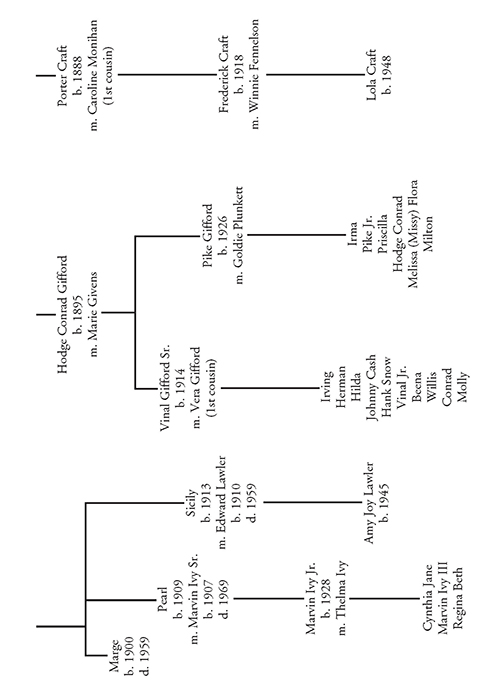A Wedding on the Banks
Read A Wedding on the Banks Online
Authors: Cathie Pelletier



Copyright © 1989, 2014 by Cathie Pelletier
Cover and internal design © 2014 by Sourcebooks, Inc.
Cover design and illustrations by Amanda Kain
Sourcebooks and the colophon are registered trademarks of Sourcebooks, Inc.
All rights reserved. No part of this book may be reproduced in any form or by any electronic or mechanical means including information storage and retrieval systemsâexcept in the case of brief quotations embodied in critical articles or reviewsâwithout permission in writing from its publisher, Sourcebooks, Inc.
Grateful acknowledgment is made for permission to reprint excerpts from the following copyrighted material:
The
Story
of
Civilization
by Will and Ariel Durant. Used with permission of Simon & Schuster, Inc.
“Woman, Woman,” written by Jim Glaser and Jimmy Payne. Copyright © 1967, 1972, 1973 by Ensign Music Corp.
“It's Beginning to Look a Lot Like Christmas,” written by Meredith Willson. Copyright © 1951 Plymouth Music Co., Inc. © renewed 1979 by Frank Music Corp. and Meredith Willson Music. International copyright secured. All rights reserved. Used with permission.
“Colinda,” written by Jimmie Davis, Doc Guidry, and L. J. Leblanc. Copyright © 1953 by Peer International Corp. Copyright renewed. International copyright secured. All rights reserved. Used with permission.
“Lodi,” written by John Fogerty. Copyright © 1969 by Jondora Music. Courtesy of Fantasy, Inc.
“The Lonely Goatherd” and “The Sound of Music,” written by Richard Rodgers and Oscar Hammerstein II. Copyright © 1959 by Richard Rodgers and Oscar Hammerstein II. Copyright renewed. Williamson Music Co., owner of publication and allied rights. Used with permission. All rights reserved.
“Old Coyote Town,” written by Larry Boone, Paul Nelson, and Gene Nelson. Copyright © 1987 by Warner-Tamerlane Publishing Corp., Believus or Not Music, WM Music Corp., Make Believus Music, and Cookhouse Music. All rights on behalf of Believus or Not Music administered by Warner-Tamerlane Publishing Corp. All rights on behalf of Make Believus Music administered by WM Music Corp. All rights reserved. Used with permission.
Old
Barn
Plans
by Richard Rawson. Copyright © 1980. Published by Mayflower Books.
“Good Ole Boys Like Me,” written by Bob McDill. Copyright © 1979 by PolyGram International Publishing, Inc. International copyright secured. All rights reserved. Used by permission.
The characters and events portrayed in this book are fictitious or are used fictitiously. Any similarity to real persons, living or dead, is purely coincidental and not intended by the author.
Published by Sourcebooks Landmark, an imprint of Sourcebooks, Inc.
P.O. Box 4410, Naperville, Illinois 60567-4410
(630) 961-3900
Fax: (630) 961-2168
Originally published in 1989 by Viking Penguin, a division of Penguin Books USA, Inc. This edition created from the 1991 trade paperback printing by Washington Square Press, a publication of Pocket Books, a division of Simon & Schuster, Inc.
Library of Congress Cataloging-in-Publication data is on file with the publisher.
April Is a Bitch: The Cruelest Month Brings Hypochondria and Frost Heaves
Spring Brings No Joy to Mudville: The Giffords Are Still Pissed Off About Christmas
Spring Slaps Portland in the Face: The Ivys Cling to the Funeral Home
Old Leaves at Mattagash's Finest Motel: The Proprietor Sees Pink
The Ancestral Ache Is Passed On: From White Pine to Old Spice
The Giffords Rethink the Ambulance Business: The Mailbox as a Divine Receptacle
The Houseguests Welcome Randy: Hollyhocks, Valiums, and a Cranberry Sweater
Sicily Grapples with Her Conscience: Arsenic, Old Lace, and Young Frenchmen
The Pinkham Motel Suffers from Malnutrition: Extraterrestrials Party with the Giffords
Cycles, Recycles, and Bicycles: Vinal and Pike Await the Tire Convention
The First Time for Second Thoughts: Amy Joy Inherits Some Art
Womanhood Slaps Prissy in the Face: Little Vinal Goes Fishing Twice
The Ivys Get Out of Dodge: Unwelcome Visitors from Portland and a Pair of Thirty-Eights
Ménage à Trois at the Maison Lawler: Sights, Sounds, and Smells of Matrimony
A McKinnon Is a McKinnon Is a McKinnon: Margie's Ghost Is Back, Back, Back
Baby Jesus Returns to Mattagash: Let the Games Begin
Junior Can't Teach Thelma New Tricks: Monique Tessier as a Businesswoman
Sicily and Pearl Rattle the Ghosts in Their Closets: Boy Meets Girl
Red Ryder Doesn't Have a Dog's Chance: Goldie Rallies Her Children
Saint Christopher Flops in Mattagash: The Giffords Give New Meaning to
Veni, Vidi, Vici
A Potpourri in the Pines Primeval: Gabriel Enters the Constitution State
Mayday! Mayday! Mayday!: Gossip in the House of Worship
A Little Native Crucifies the Nativity Scene: Angels on the Yellow Brick Road
The Montagues, McKinnons, Capulets, and Cloutiers Shun the Ball: A Good Time Is Had by the Rest
The Last Barn Builder, Yo-Ho-Ho, and a Bottle of Rum: Bruce Sees Dog Days in May
The Pines Are Alive with Music: Being a Gifford Means Never Having to Say You're Sorry
There's Got to Be a Morning After: Ravens, Coyotes, and Beer Cans
Professional Mourners Provide a Moon for the Misbegotten Funeral: Lessons of Life in the Graveyard
Albert and Bruce: A Man, His Dog, His Swimming Pool
Bottom-of-the-Hill Giffords: The Good Ole Boys of Northern Maine
Goldie and Her Children: Top of the Hill Where They Belong
Sicily and Amy Joy: The Oak and the Acorn
This novel is dedicated to all my French Canadian ancestors
AND
Also to my grandmother, Edith Thibodeau Pelletier, who learned to speak English from her grandchildren.


Civilization is a stream with banks. The stream is sometimes filled with blood from people killing, stealing, shouting, and doing the things historians usually record, while on the banks, unnoticed, people build homes, make love, raise children, sing songs, write poetry⦠The story of civilization is the story of what happened on the banks.
âWill Durant,
The
Story
of
Civilization
“We camped in the picturesque Mattagash River Valley in northern Maine, on the Canadian border, where the inhabitants are known to outsiders as Mattagashers. These are the Anglo-Saxon inheritors of ancient Indian soil once owned by the Mattagash Indian tribe. I was told by a townsman that the residents prefer being called Mattagashers to Maniacs, which is how the rest of Maine refer to themselves.”
âHorace Thud, author and canoe enthusiast, September 1927
Winters are long in Mattagash, Maine. They are long and white and icy. They arrive when they please, bawdy landlords, and they depart when they are ready, well looted, leaving behind the soggy fields of molded hay, the houses peeling their summer paint, the potholes a foot deep in the one good road twisting its way to Watertown. When the winters finally leave, they leave of their own accord, and behind them lie the cabin fever dreams, those sentiments that have lain dormant as autumn seed, waiting for the right temperature, the right caress of sunlight, the proper texture of soil to sprout. And after five months of snow, what man is so hardened that he does not melt at the sight of buds on the wild cherry? What deer does not lift its ears to the first music of the old river running free again, shed of its blanket of ice? What woman does not scan the damp earth in the field near her house so closely that her eye can finally trace the ghostly outlines of cucumber beds, sweet peas, and all the fiery carrots she will grow there in a garden when the land is dry enough? When the last rooted cold leaves the earth, what child does not dust off the baseball bat, trim the string from last year's softball, and wait patiently for the muddy slush around home plate, and in the dip near second base, to go deep into the soil, to go down to ancient riverbeds and streams and leave the field alone long enough for a few solid games of ball before school recesses for the summer?
It is true in Mattagash, Maine, as it is true in all the cities and towns of the world, that spring is medicinal. Spring is a messenger. Spring is a politician wanting all votes. Spring does not discriminate between the socially established families of towns and the antisocially established, the lawfully inhabited and the unlawfully inhabited. Neither do potholes. Or frost heaves. And it is common knowledge in Mattagash that a barrage of frost heaves on the road to Watertown will bounce all the spongy pink curlers off a female McKinnon head as quickly as it will a Gifford's. Potholes, born from seventy-plus tons of logging trucks loaded down with logs, if hit at even a moderate speed, will suspend the brain of any resident in its cranium for a second or two. This will happen whether the brain is full of good deeds or bad deeds. A pothole will rattle a hippocampus enough that scenes from the driver's childhood flash quickly before the eyes. Then he or she jolts out of the pothole again, out of the bleary past, still happily on the way to Watertown, but experiencing a bit of difficulty in recalling the errand that had precipitated the journey. The sage who said that into every life a little rain must fall surely suffered at least one spring in Mattagash, Maine. It takes such a sage to know that with every fifty thousand cherry blossoms comes a pothole, with every promise of a bountiful garden comes the looming frost heave.
The spring of 1969 was not much different from any other spring, at least to the meteorologists down in faraway Bangor. But if you've wintered successfully in Mattagash, or in any other snow-bogged geography, each spring is handpicked. Each spring is best. Such was the spring of '69, when more rugs than in any other year seemed to float like large colored stamps from clotheslines, more storm windows were put sleepily away, more paint jobs brushed to perfection, more gardens planned and plotted, more mason jars bought and stored for the bounty.
It was in the heart of this rebirth, amid the first ragged strains of the old Mattagash River running free and pure, that Amy Joy Lawler broke the news to her mother, Sicily. There would be a wedding. There would be no long and polite waiting period. After twenty-three years of living, and with one foot flat into spinsterhood, Amy Joy knew perfectly well what she wanted to do with her life. She knew how she must set about doing it. And it all included Jean Claude Cloutier from Watertown, Maine, known as Frogtown to Mattagashers. At first Sicily was thunderstruck. At first she was only able to mouth the words.
“A Frenchman?” she asked her only child. “You're going to marry a
Frog
?”
Amy Joy ran a brush through her hair, a brown forest with two silver streaks adorning the sides. The streaks were artificial, coming from a can of Clairol spray-on color rather than from any genetic coding, and were reapplied after each shampoo.
“No, he's a Russian,” said Amy Joy, and then sucked some Pepsi up from its bottle. “He's from Watertown, for crying out loud. Of course he's French.”
“Is that the creature who's been driving into our yard for a month, tooting the horn for you instead of coming to the door?”
“I guess,” said Amy Joy. “That must be the creature. Besides, everyone in Mattagash toots the horn instead of knocking. Why is it so bad if Jean Claude does it?”
“Are you telling me that my future son-in-law, the only one I'll ever have, I might add, assuming
please
Jesus
this is your only marriage, are you telling me that a man I recognize only by his
toot
will be a part of the McKinnon family?” Sicily had been a McKinnon before her marriage to Ed Lawler, and after all those years of marriage, after all those signatures of “Sicily Lawler” on checks and letters, she still thought of herself as Sicily McKinnon.
“That's what I'm telling you.” Amy Joy put a stick of spearmint gum onto her waiting tongue and then took a long drink of Pepsi.
“Oh Lord,” said Sicily, and sank back into her chair. She had to think fast. How was she going to blockade this all on her own? She had managed to keep Amy Joy out of stewardess school in Missouri and a junior college for hotel-motel management in the Virgin Islands, not to mention having protected her from a Peace Corps job teaching English somewhere in Africa. That last thought was appalling to Sicily. She imagined her only child in a sweltering tent, surrounded by little heathens, in a country she'd never seen, teaching English, a language she didn't know. It had, after all, been her worst subject all through high school.
But Sicily had managed to forestall all of Amy Joy's cabin fever dreams. And that's just what they were. Amy Joy had all winter to lie around the house and eat Fig Newtons and ponder the mysterious places of the world. She had plenty of time from October to March to fill out every application form in every
True!
story that passed through her hands. And one, to Sicily's gravest displeasure, had even been for a diesel mechanic school in Nashville, Tennessee. Another had precipitated a visit from an air force recruiter who told Amy Joy that if she lost thirty pounds they'd send her to Lackland Air Force Base in Texas.
“She's as bad as the birds,” Sicily had said to Winnie Fennelson Craft, on the Lawler front porch, just a month earlier. “When something inside her says
go
, she just wants to take off for anywhere.”
“At least the birds know where they're going,” thought Winnie Craft, who had never liked Sicily's only child. “Too boy crazy,” she told her own daughter, who was a constant crony of Amy Joy's.
“Texas. Imagine,” Sicily had said to her best friend.
“Wasn't that where the girl who married Percy Mullins was from?” Winnie had mused. “You remember her. She was the one had the black blood in her.”
“She hates to get up before noon,” Sicily had said, trying to jar Winnie into a sympathetic understanding of the situation. “What would Amy Joy do in the air force? They blow that bugle at dawn.”
“They had a baby black as tar pitch,” Winnie had replied, and fingered the fine hairs pushing out gently as little brushes from the tip of one nostril, a habit popular with all the Fennelson women.
But big wide Texas, full of the scorpions Sicily had seen on
Nova,
was not nearly as dangerous as Frogtown, not when it came to the possibilities of Amy Joy tying herself up for life to a Frenchman. Sicily remembered the last time they had clashed above and beyond the usual mother-daughter wrangling about dates. It had been a decade ago. It had been when Amy Joy was about to bust if she couldn't marry Chester Lee Gifford, a man almost old enough to be her father, not to mention his
Gifford-dom.
The Giffords had been the scourge of Mattagash since times immemorial. Yet if someone dug Chester Gifford up from among the dead, which he was, and stood him next to a Frenchman, so help her, Sicily McKinnon Lawler would be hard-pressed to choose between them. So she used the same tactics to squelch the wedding plans that had proved themselves worthy against the air force scrape and the Peace Corps fiasco. She took to her bed, citing a flare-up of several organs that had been accommodating for years but had now turned on her. Kidneys could rule a person's life if they got pissed off. This was, unbeknownst to Amy Joy, the same tactic Sicily had pulled on the hapless Marge McKinnon, her oldest sister, when Marge refused to let Sicily marry Ed Lawler.
Ed
Lawler.
“What would your father say?” Sicily asked from her bed on the third day of her discomfiture.
“He'd be all for it,” said Amy Joy. “He always said the French people around here were twice as smart as the Scotch Irish. He said they speak two languages and the Scotch Irish can't even speak one.”
Amy Joy leaned in the doorway and stared at the paint-by-number Jesus hanging over Sicily's bed. He was holding a woolly lamb. It had confused her as a child, this painting. The lamb looked as if it really wished to be put down, to be let loose, to be gamboling in some meadow. In the fourth grade it preyed upon Amy Joy's mind so that she had rewritten a nursery rhyme: “Baa Baa, Jesus, have you any wool?”
“Did he really say that?” Sicily asked, and stared vaguely at her toes beneath the blankets. Ed had committed suicide, ten years ago that September during a rainy autumn. The autumn her sister Marge expired. The autumn Chester Lee Gifford ran a stolen car into a tree and died before he could crawl out.
“Did your father really say that?” Sicily asked again. Ten years later, ten years down the road of forgiving him for his abandonment of her and her daughter, she was still finding out secrets about him.
“Why don't you get rid of that old painting?” Amy Joy asked.
“That painting?” Sicily was horrified. “Aunt Marge would roll over in her grave. She loved that painting. She used to tell of the long afternoons Mama spent working on it, with only the sound of the clock to keep her company. It's very old, Amy Joy. It'll go to you when I die.” Sicily coughed to emphasize that this might be at any moment.
“And on to the dump,” Amy Joy said.
“What, dear?” asked Sicily. The “dear” was an added mountain of guilt. It said
even
after
all
you're putting me through, I still love you
.
“I have something to tell you.” Amy Joy pushed one of the silver streaks of hair behind an ear and folded her arms. These pained Sicily, these two shimmering strips down her daughter's hair. But she would not begin on them now. She was saving her voice and her displeasure for the wedding issue. Sicily did notice, happily, that Amy Joy had lost weight since the weather had changed and she'd gotten out for more exercise.
“God only knows how she's getting it, though,” Sicily thought. She winced as a picture of Jean Claude Cloutier, revving up his Chevy Super Sport in her driveway and beating on its horn, flashed through her mind. “Even that awful horn sounds French,” she thought. “A Frog mating call.”
“I'm going to say this just one more time,” said Amy Joy, and took her eyes away from Jesus and the lamb to focus them instead on her mother. “I will get married in three, count them,
three
weeks.” She held up three fingers, each nail sporting a different colored nail polish. Sicily took note. After the wedding plans were canceled, she would work on the nails.
“And I will do so,” continued Amy Joy, “whether you are there or not. Is that clear?”
Sicily rolled over on her side, her back to Amy Joy.
“Furthermore,” Amy Joy continued, her eyes back on the painting of Jesus and the unwilling lamb, “I don't care which of your body parts
explodes
because of this.”
Sicily felt her kidneys kick at her insides, like little bean-shaped fetuses. They were warning her. Amy Joy could really make her physically ill by marrying Jean Claude. Serious stress had done that to many a formerly healthy Mattagash woman, and the McKinnon name had turned up, not infrequently, among their lot. June Kelley had nearly died from fatigue and shock when her daughter married that divorced man from New Jersey she'd met at Loring Air Force Base. And he spoke English!
“I don't care, I promise you, if your pancreas flies out the window,” Amy Joy told her mother. “So there.”
Sicily felt an embarrassing jab from her pancreas and was surprised she knew where it lay. How, then, could she be imagining this, as Amy Joy claimed she was, if at just the mention of its name, her pancreas throbbed? This was an organ she might have guessed was in her
head
a minute ago. Now here was a soft jabbing from behind her stomach, an elongated finger poking. Her pancreas discovered, thanks to a thankless daughter.
“I don't care if your bladder bursts at the church,” Amy Joy went on.
“Oh please,” Sicily murmured.
“I have heard of every illness known to a heart, a lung, a kneecap. You've used them all, and you've used them out. They don't work no more.”
